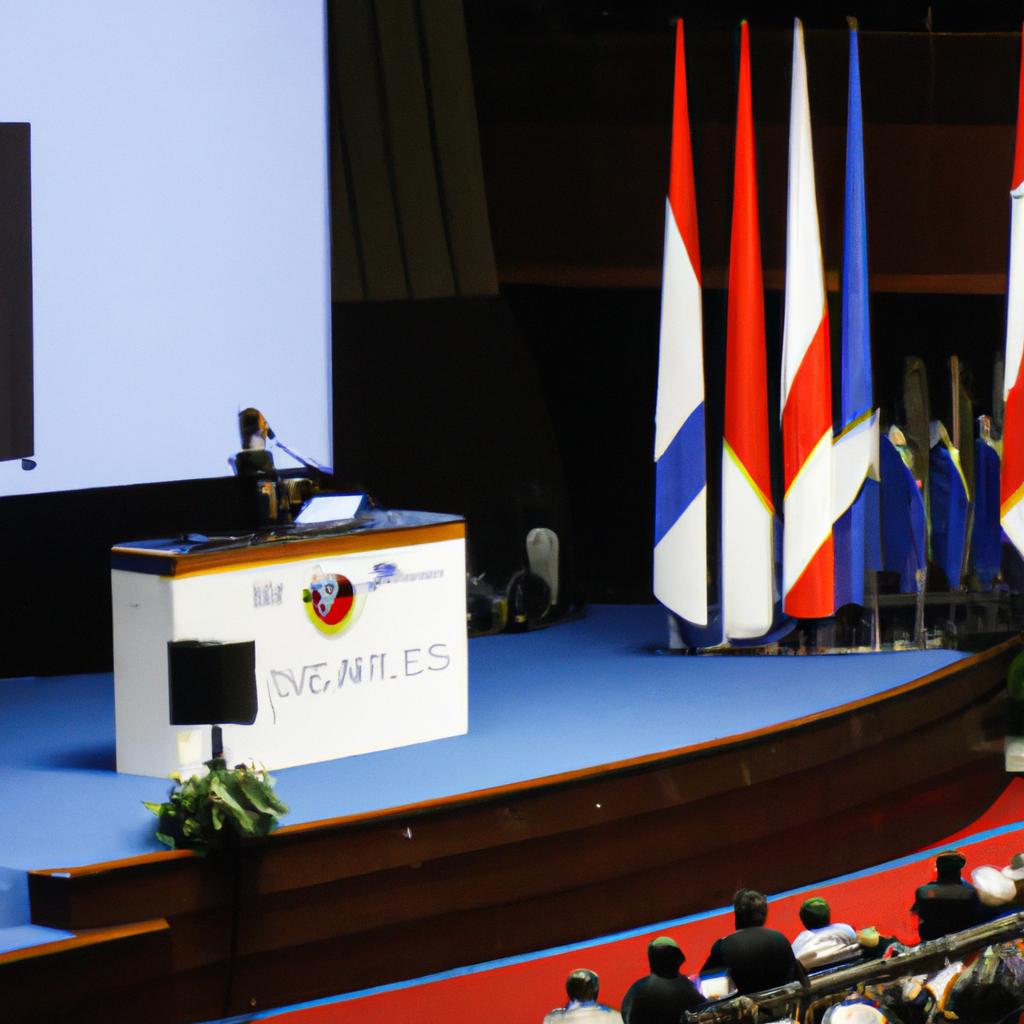Diplomatic relations in the realm of travel politics play a pivotal role in shaping world events. The intricate web of interactions between nations on matters concerning global mobility and international tourism is often overlooked, yet it holds significant implications for both individual countries and the broader global community. This article aims to shed light on the complex dynamics that underlie diplomatic relations in travel politics by examining their impact on various aspects such as tourism policies, visa regulations, and international cooperation.
To illustrate the profound influence of diplomatic relations in travel politics, consider the case study of Country X and Country Y. Both nations are renowned tourist destinations with diverse cultural offerings and picturesque landscapes. However, due to strained diplomatic ties resulting from political disputes, citizens of Country X face severe restrictions when attempting to visit Country Y. These limitations not only hinder cross-cultural exchanges but also impede economic growth opportunities that stem from an influx of tourists. Thus, this example demonstrates how diplomacy plays a critical role in facilitating or hindering travel experiences, thereby affecting tourism industries and bilateral relationships between nations.
The significance of analyzing diplomatic relations in travel politics lies in its potential to foster mutual understanding and promote peace among nations. By scrutinizing the mechanisms through which countries negotiate travel policies and cooperate on issues related to border control and visa regulations , we can gain insights into the underlying factors that contribute to tensions or cooperation between nations. For instance, countries that have strong diplomatic relations in travel politics are more likely to collaborate on initiatives such as visa-free travel agreements, streamlined immigration processes, and shared tourism marketing campaigns. These measures not only facilitate smoother travel experiences for individuals but also promote economic growth through increased tourist arrivals and cross-border investments.
On the other hand, strained diplomatic relations can give rise to restrictive visa policies, heightened security measures, and even travel bans. Such actions limit the movement of people between countries and can have far-reaching consequences on tourism industries, international business ventures, and cultural exchanges. Furthermore, these restrictions may breed resentment and further escalate existing conflicts or disputes.
Understanding the complex dynamics of diplomatic relations in travel politics is crucial for policymakers and stakeholders in the tourism industry. By recognizing the interplay between political factors and travel policies, governments can identify opportunities for collaboration and find common ground with other nations. This includes engaging in dialogue to address concerns related to security threats, cultural differences, or economic disparities that may shape visa regulations or inbound tourism strategies.
In conclusion, diplomatic relations play a pivotal role in shaping travel politics around the world. The decisions made by nations regarding visa regulations, border control measures, and international cooperation significantly impact tourism industries and bilateral relationships. Analyzing these dynamics provides valuable insights into how countries navigate their interactions on global mobility issues while promoting mutual understanding and peace among nations.
Historical context of diplomatic relations
Historical Context of Diplomatic Relations
In the realm of international travel politics, understanding the historical context of diplomatic relations is crucial. The complex interplay between nations has shaped not only the trajectory of world events but also the experiences and opportunities available to travelers. To illustrate this point, let us consider a real-life case study: the Cold War era.
During the Cold War, which spanned from roughly 1947 to 1991, tensions between the United States and the Soviet Union defined global geopolitics. This period was marked by ideological differences, military build-ups, and proxy wars fought across various regions. Such intense rivalry had profound implications for diplomatic relations and consequently impacted international travel in significant ways.
To comprehend how diplomatic relations have influenced international travel dynamics throughout history, it is essential to examine their multifaceted effects. Here are some key points to consider:
- Economic consequences: Diplomatic relationships shape economic partnerships that can either facilitate or hinder cross-border trade and tourism.
- Travel restrictions: Tense diplomatic relations often lead to increased visa requirements, security measures, and border controls that limit ease of movement for tourists.
- Perception and stereotypes: Diplomatic conflicts may perpetuate negative perceptions or stereotypes about certain countries or cultures, affecting tourist attitudes towards potential destinations.
- Cultural exchanges: On the other hand, positive diplomatic ties foster cultural exchanges that encourage tourism growth through shared arts, traditions, and heritage.
To further grasp these interconnected dynamics surrounding diplomatic relations in travel politics, we present a table summarizing notable historical events and their impact on international travel during different time periods:
| Time Period | Historical Event | Impact on International Travel |
|---|---|---|
| Post-WWII | Formation of the United Nations | Facilitated cooperation & eased travel barriers |
| Cold War | Berlin Wall construction | Restricted access & divided communities |
| Post-Cold War | Fall of the Iron Curtain | Opened up new destinations & cultural exchanges |
| Present Day | Global pandemic (COVID-19) | Disrupted travel, closed borders, and restrictions |
In conclusion, recognizing the historical context of diplomatic relations allows us to comprehend their far-reaching consequences on international travel. From economic implications to visa requirements and cultural exchanges, these relationships shape not only political landscapes but also travelers’ experiences. Understanding this intricate interplay provides valuable insights into the impact that diplomatic relations have had and continue to have on global mobility.
The subsequent section will explore in greater depth how diplomatic relations influence international travel dynamics and shed light on various examples throughout history.
The impact of diplomatic relations on international travel
The historical context of diplomatic relations provides valuable insights into the impact it has on international travel. Understanding the dynamics between nations and their interactions is crucial in comprehending how these relationships shape the world of tourism. To illustrate this, let us consider a hypothetical scenario involving two countries with strained diplomatic ties.
Imagine Country A and Country B, neighboring nations that have recently experienced political tensions due to territorial disputes. As a result, both countries have imposed strict visa regulations and travel advisories for their citizens traveling to each other’s territories. This example highlights how diplomatic relations directly affect the ease of movement for travelers and can significantly hinder cross-border tourism.
The impact of diplomatic relations on international travel can be further understood through several key factors:
- Visa requirements: In cases where diplomatic relations are tense or non-existent, visa restrictions may be imposed as a means to control inflow from certain countries deemed unfavorable by the host nation.
- Travel advisories: Governments issue travel advisories based on their assessment of security risks in specific destinations. These advisories can discourage tourists from visiting regions affected by poor diplomatic relations or conflicts.
- Tourist perceptions: Perception plays a vital role in shaping traveler behavior. If negative narratives surrounding diplomatic tensions persist in media coverage, potential visitors may develop reservations about visiting certain countries, impacting tourist numbers negatively.
- Economic implications: Strained diplomatic relations can lead to economic sanctions or trade barriers which could indirectly affect infrastructure development and investment in the tourism sector.
To better understand the relationship between diplomacy and international travel, let us examine the following table showcasing examples of how different types of diplomatic situations influence visitor arrivals:
| Diplomatic Situation | Visitor Arrivals |
|---|---|
| Positive | Steady increase |
| Neutral | Moderate fluctuations |
| Tense | Significant decline |
| Severely strained | Sharp decrease |
This table provides a glimpse into the potential impact diplomatic relations can have on international travel, emphasizing how positive relationships foster growth while tense or severely strained relations result in decreased visitor numbers.
In light of these considerations, it is clear that diplomatic relations play a crucial role in shaping international tourism. The ease or difficulty of cross-border travel directly stems from the level of diplomacy between nations. In the subsequent section about “Key players in travel politics,” we will delve deeper into the individuals and organizations involved in influencing diplomatic ties to further explore their impact on global travel dynamics.
Key players in travel politics
Diplomatic Relations in Travel Politics: World Events
The impact of diplomatic relations on international travel has been a crucial aspect to consider when examining the dynamics of global tourism. Not only do these relations shape the movement of people across borders, but they also have significant implications for economic cooperation and cultural exchange. A notable example that highlights this connection is the case study of China and Taiwan.
China-Taiwan Diplomatic Relations: The relationship between China and Taiwan presents an intriguing scenario where politics intertwine with travel. Due to their complex political history, both entities claim sovereignty over one another, leading to strained diplomatic ties. This situation has resulted in limited direct flights between mainland China and Taiwan, impacting the ease of travel for individuals from both regions. Consequently, travelers often need to take indirect routes or transit through third countries, adding inconvenience and cost to their journeys.
- Frustration resulting from bureaucratic barriers.
- Anxiety caused by uncertainty regarding visa requirements.
- Disappointment due to missed opportunities for cross-cultural engagement.
- Resentment towards political systems hindering freedom of movement.
Table: Impact Factors
| Factor | Positive Effect | Negative Effect |
|---|---|---|
| Cultural | Enhanced diversity | Limited exposure |
| Economic | Increased revenue | Reduced investment |
| Political | Strengthened ties | Strained relations |
| Social | Enriched exchanges | Isolation |
Considering these factors, it becomes evident that diplomacy plays a vital role in shaping the landscape of international travel politics. By fostering positive relationships among nations, governments can facilitate smoother travel experiences for individuals while promoting economic growth and cultural understanding.
Transition into subsequent section: As we explore further aspects related to diplomatic negotiations, it is essential to acknowledge the challenges faced in finding common ground amidst diverse interests and perspectives. Understanding these obstacles will shed light on how negotiations influence the realm of travel politics.
Challenges faced in diplomatic negotiations
Having examined the key players involved in travel politics, we now turn our attention to the challenges faced during diplomatic negotiations. To illustrate these challenges, let us explore a hypothetical case study involving two countries with diverging interests and contrasting political ideologies.
Challenges Faced in Diplomatic Negotiations
In this hypothetical scenario, Country A is known for its strict immigration policies aimed at preserving national security, while Country B values open borders as a means of promoting international cooperation and cultural exchange. As travelers from both countries attempt to navigate their respective visa processes, tensions arise due to conflicting priorities. This case study highlights several challenges that often emerge within diplomatic negotiations surrounding travel politics:
-
Differing Immigration Policies:
- Country A’s stringent screening process versus Country B’s lenient entry requirements
- The potential risk posed by allowing individuals from either country unrestricted access
-
National Security Concerns:
- Balancing the need for secure borders against facilitating convenient travel opportunities
- Identifying potential threats without unduly infringing on individual liberties
-
Economic Considerations:
- Weighing the economic benefits derived from tourism and business travels against perceived risks
- Recognizing the impact of restrictive measures on industries reliant on international visitors
-
Cultural Exchange and Soft Power:
- Evaluating the social and cultural advantages gained through fostering cross-border interactions
- Overcoming ideological differences between nations to promote mutual understanding
These challenges underscore the complex nature of diplomatic negotiations within travel politics. Finding common ground requires extensive dialogue, compromise, and careful consideration of various factors influencing each country’s stance.
Looking ahead, it becomes evident that resolving such diplomatic disputes has far-reaching implications beyond just matters of policy-making. In particular, economic considerations play a crucial role in shaping negotiations related to travel politics. Therefore, we will delve into exploring the economic implications of diplomatic disputes in the subsequent section.
Economic implications of diplomatic disputes
Diplomatic Relations in Travel Politics: World Events
Having discussed the challenges faced in diplomatic negotiations, it is crucial to explore the economic implications of diplomatic disputes. This section will examine how such disputes can impact various aspects of a country’s economy and provide insights into their far-reaching consequences.
Economic Implications of Diplomatic Disputes
To illustrate the potential economic ramifications of diplomatic disputes, let us consider a hypothetical case study involving Country A and Country B. These two nations have historically enjoyed strong trade relations, with significant investments flowing between them. However, due to a recent political disagreement over territorial claims, tensions have escalated, leading to strained diplomatic ties. As a result, several economic consequences have unfolded:
-
Trade restrictions: In response to the dispute, both countries may impose trade barriers such as tariffs or import/export bans on each other’s goods and services. This restriction on bilateral trade not only disrupts established supply chains but also hampers market access for businesses on both sides.
-
Tourism decline: One immediate effect of diplomatic disputes is often a decrease in tourist arrivals. Negative perceptions surrounding safety concerns or geopolitical instability can deter international travelers from visiting either country involved in the conflict. Consequently, the tourism industry suffers losses in revenue and employment opportunities.
-
Investment uncertainty: Diplomatic disputes create an atmosphere of uncertainty that discourages foreign direct investment (FDI). Investors become hesitant to commit capital amidst escalating tensions and fear potential disruptions to business operations or expropriation risks. This lack of FDI inflows can hinder overall economic growth and development.
-
Currency fluctuations: Heightened geopolitical tensions can cause currency volatility as investors adjust their portfolios based on perceived risks associated with particular currencies. This fluctuation impacts exchange rates which then influence cross-border transactions, making imports costlier and exports less competitive.
The table below provides a summary of these key economic implications resulting from diplomatic disputes:
| Economic Implications | Examples/Effects |
|---|---|
| Trade restrictions | Tariffs, import/export bans |
| Tourism decline | Decrease in tourist arrivals |
| Investment uncertainty | Hesitation to commit foreign direct investment |
| Currency fluctuations | Volatility and impact on cross-border transactions |
In summary, diplomatic disputes can have severe economic repercussions for nations involved. The trade restrictions, tourism decline, investment uncertainty, and currency fluctuations highlighted above demonstrate the complex interplay between politics and economics. These consequences emphasize the need for careful consideration of diplomatic relations in travel politics to mitigate potential negative impacts.
Transition into subsequent section:
As we look ahead to future trends in travel politics, it becomes evident that proactive measures must be taken to address these challenges and foster positive international relationships. By analyzing emerging patterns and anticipating potential conflicts, countries can better prepare themselves for effective diplomacy while ensuring a conducive environment for global cooperation.
Future trends in travel politics
Section Title: ‘Impact of Diplomatic Disputes on International Travel’
As the world becomes increasingly interconnected, diplomatic disputes between nations have a significant impact on various aspects of global affairs. One area where these disputes can create ripple effects is international travel. This section will explore the consequences of such tensions on travel politics, highlighting economic implications and future trends.
Economic Implications:
Diplomatic disputes often result in strained relations between countries, leading to adverse economic consequences for the tourism industry. To illustrate this, let us consider a hypothetical scenario involving Country A and Country B. These two nations were engaged in a heated political disagreement that led both governments to impose travel restrictions and visa requirements on each other’s citizens.
This example highlights some key economic implications resulting from diplomatic disputes:
- Decline in tourist arrivals: The imposition of travel restrictions can deter potential tourists from visiting certain destinations affected by diplomatic disagreements.
- Reduced bilateral trade: Diplomatic tensions may lead to decreased levels of business and trade activities between involved countries, indirectly impacting the demand for corporate travel.
- Loss of revenue: When countries engage in reciprocal acts such as imposing tariffs or restrictive measures against one another, it has an adverse effect on tourism-related businesses like hotels, restaurants, and transportation services.
- Negative perception: Prolonged diplomatic disputes create negative perceptions about particular destinations among travelers who prefer politically stable environments.
Future Trends:
Looking ahead, it is crucial to identify potential trends that might emerge as a result of ongoing diplomatic conflicts worldwide:
| Trend | Description | Implication |
|---|---|---|
| Shift towards alternative destinations | Travelers might seek out substitute locations unaffected by diplomatic disputes. | Tourism revenue could be redistributed away from regions experiencing conflict. |
| Increased use of technology | With advancements in technology, virtual reality experiences may gain popularity as a means to explore culturally rich destinations without the need for physical travel. | Travel industries could adapt to incorporate virtual tourism experiences and enhance revenue streams. |
| Growing importance of diplomatic negotiations | Diplomatic disputes may lead governments and international organizations to prioritize peaceful resolutions, recognizing the impact on various sectors including travel. | Enhanced diplomacy efforts can potentially mitigate disruptions in global travel politics. |
In summary, diplomatic disputes have far-reaching consequences on international travel. The economic implications encompass a decline in tourist arrivals, reduced bilateral trade, loss of revenue for tourism-related businesses, and negative perceptions about affected destinations. Looking forward, future trends might include a shift towards alternative locations unaffected by conflicts, increased use of technology in the travel industry, and an emphasis on diplomatic negotiations to resolve such disputes effectively.
By understanding these dynamics, policymakers and stakeholders can work together to navigate through challenging times while striving for stability and growth in the realm of travel politics.
 Plains News
Plains News



